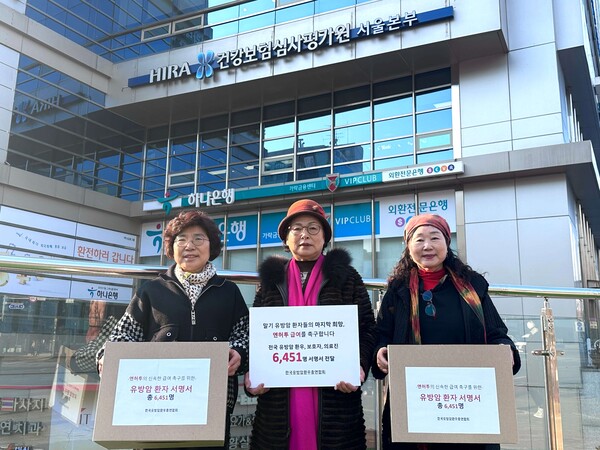More than a month has passed since Enhertu (trastuzumab deruxtecan), a new breast cancer drug provided by Daiichi Sankyo Korea and AstraZeneca Korea, passed the Drug Reimbursement Evaluation Committee under the Health Insurance Review and Assessment Service (HIRA).
However, news on its reimbursement has yet to be heard, prompting breast patients to repeat their appeals for the drug’s speedy reimbursement.
Enhertu can extend survival time by two to three times but has yet to get insurance coverage despite winning regulatory approval, forcing breast cancer patients to pressure the government by conducting a survey on the treatment environment of breast cancer in Korea to ensure that it is quickly paid.
The Union of Korean Breast Cancer Patients said Tuesday that it recently surveyed the domestic breast cancer treatment environment of 110 HER2-positive breast cancer patients. The survey found that seven out of 10 breast cancer patients (73.6 percent) direly need improved access to new breast cancer drugs' and 95 percent would pay more than 5 percent out-of-pocket if it is an innovative new drug.

Patients with HER2-positive metastatic breast cancer have the worst prognosis among breast cancers, and there is a high need for effective new drugs that improve patient survival. As a result, 81 respondents (73.6) percent of HER2-positive metastatic breast cancer patients said that improved access to new drugs was the top priority for breast cancer treatment. In comparison, 20 respondents (18.2 percent) said they needed health screenings, and eight (7.3 percent) called for genetic testing.
Asked if they would be willing to pay "more than 5 percent" of their health insurance deductible for an innovative new drug that improved survival time for breast cancer patients by two to three times, 94.5 percent (104 respondents) answered "yes."
In addition, 80 percent (88 respondents) of HER2-positive metastatic breast cancer patients would be willing to pay an additional 10 percent (about 300,000-400,000 won ($225-$300) of their health insurance deductible for an innovative new drug. They will pay higher out-of-pocket expenses if the treatment has proven innovative.
"Patients are waiting for insurance coverage of Enhertu, an innovative new drug for breast cancer that can extend patient survival by more than two to three times. Many patients have been contacting us through our website and phone calls," said Kwak Jeom-soon, head of the union. "Breast cancer patients are desperate for effective new drugs, with 95 percent of patients saying they would like to use the new drug even if it means increasing their out-of-pocket payment."
Acknowledging there remain procedures, such as drug price negotiations, Kwak said, "We hope that innovative new drugs will be covered as soon as possible for patients with late-stage metastatic breast cancer."
A patient treated with Enhertu said, “I keep thinking about and calculating how much I need to pay for my treatment before the drug gets insurance benefit. I worry about how I will pay for it again if it is delayed by a month," said a breast cancer patient.
The patient explained that since she must take Enhertu every three weeks, if its reimbursement is delayed by a month, she will need 20 million won for two doses of Enhertu.
“I hope the government realizes that a month or two is a very long time for a patient," the patient added.
The patients’ union plans to send the results of the survey to the National Health Insurance Service (NHIS), which negotiates Enhertu’s prices, the co-developers of the drug, Daiichi Sankyo and AstraZeneca, as well as the Ministry of Health and Welfare and the National Assembly, where the petition was filed, to urge them to pay the patients as soon as possible.
Related articles
- Enhertu moves closer to insurance coverage by passing drug-reimbursing panel
- Cancer expert appreciates Enhertu’s efficacy, advocates for flexible coverage
- New ADC drug Enhertu fails to pass reimbursement assessment panel
- All eyes of patients and drugmakers are on reimbursement of Enhertu
- ‘Recognizing Enhertu’s innovative drug price will help Korean patients and industry’
- Innovative new drug Enhertu to get insurance benefits as early as April
- Enhertu to get insurance coverage for metastatic breast/stomach cancer from April
- Breast cancer drug Enhertu's breakthrough results unveiled at GBCC 2024

